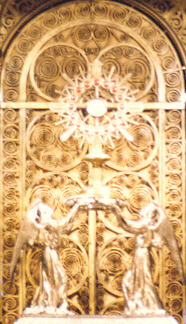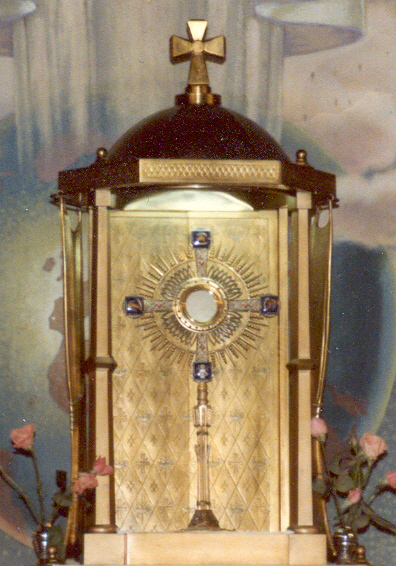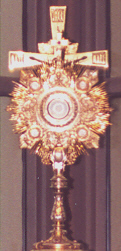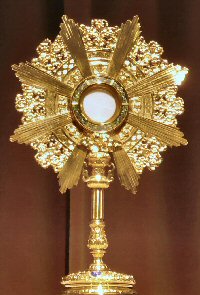
Home Page Eucharist Adoration

Corpus Christi. . .
The Body of Christ. . .
Come, Let Us Adore Him
The History of Eucharistic Worship
Up until the 11th Century, out of great respect for the hidden God in the Eucharist, the consecrated host and chalice were never elevated during the Holy Sacrifice of the Mass. The only time the consecrated Host was displayed was at communion. The elevating of the host and chalice originated in this century as did the ringing of the bell announcing the moment of consecration. It was an eloquent liturgical gesture indicating that the bread is truly and actually changed into the Body of the Lord and must necessarily be venerated. It was a summons to worship.
In 1264, Pope Urban IV instituted the feast of Corpus Christi (Body of Christ) to create an attitude of mind which encouraged and prepared the way for greater attention to the adoration of Jesus in the Blessed Sacrament.
St.
Alphonsus de Liquori in the 18th Century introduced the custom of paying regular
visits to our Lord hidden in the tabernacle. Since then, many religious
orders have devoted themselves to the unceasing adoration of the Blessed
Sacrament.
Home Page
Top
Come, Let Us Adore Him
The
attention of believers is focused on the sacrament in which Christ has left
Himself: Body, Blood, Soul, and Divinity. It is the reason for considering
it as the holiest reality: "The Blessed Sacrament," living memorial of the
redeeming Sacrifice.
Come, Let Us Adore Him
The Devotion of Eucharistic Worship

There
are many devotions practiced in the Catholic church. Some are practiced in
all countries of the world and by persons of every age, station and walk of
life. The
most universally practiced devotion is devotion to the Blessed
Sacrament. No
devotion can compare in dignity, holiness and power with our
Lord Jesus Christ
present in the Blessed Sacrament. In other devotions we
honor God's creatures,
but in the Blessed Sacrament, we honor the Creator
Himself.
Come, Let us Adore Him
The Church Adores Her Precious Treasure, The Eucharist, Perpetual Memorial of Redeeming Sacrifice.
Let us fall down in adoration of so great a sacrament. Christ who died and rose for us is really present in the Holy Eucharist.
In the Consecrated Bread and Wine, the same Jesus of the Gospels remains with us whom the disciples met and followed, whom they saw crucified and risen, whose wounds Thomas touched, exclaiming prostrate in adoration: "My Lord and my God!"
In the sacrament of the altar, there are offered for our contemplation the full depths of the mystery of Christ, the Word and the flesh, the divine glory and His tent among men. Before this sacrament, we are sure that God is "with us," that in Jesus Christ He assumed all the dimensions of our human nature, except sin, emptying Himself of His glory to clothe us with it.
The
invisible face of Christ, the Son of God, is manifest in His Body and Blood in
the simplest and, at the same time, the most exalted way possible in this world.
Home Page
Top
Come, Let us Adore Him
The Eucharist Renews Our Hearts and Opens us for Communion and Service.
We
are nourished with this bread to become authentic witnesses of the Gospel.
We need this bread to grow in love, the necessary means for us to recognize the
face of Christ in the faces of our brothers and sisters. Our community has
need of the Eucharist in order to continue on the path of missionary renewal on
which it has set out.
Come, Let us Adore Him
Jesus Nourishes us on the
Journey of Life
for the Exodus into Eternal Life.
 On
this journey Jesus goes before us, with the gift of Himself to the point of
sacrifice and offers Himself to us as nourishment and support. "All ate
and were satisfied." The echo of a feast that has gone on without
interruption for 2,000 years reaches us through the words of the Gospel we have
just heard. A feast of the people on their way in their exodus from the
world, nourished by Christ, the true Bread of salvation.
On
this journey Jesus goes before us, with the gift of Himself to the point of
sacrifice and offers Himself to us as nourishment and support. "All ate
and were satisfied." The echo of a feast that has gone on without
interruption for 2,000 years reaches us through the words of the Gospel we have
just heard. A feast of the people on their way in their exodus from the
world, nourished by Christ, the true Bread of salvation.
And
you, Jesus, living Bread who gives life, bread of pilgrims, "May you feed us,
may you guard us, may you let us see good things in our homeland eternally."
Amen. From a homily given by Pope John
Paul II on Sunday the Feast of Corpus Christi - Feast of the Body of Christ.
Come, Let us Adore Him
What the Saints Did
The saints were fully aware that Christ in the Blessed Sacrament is a reality - that in the Blessed Sacrament His heart is living, beating, and waiting to refresh us with His graces.
So
conscious were the saints of the awesome power and holiness of our Eucharistic
Lord in the tabernacle that they were filled with delight. They made it a
point to be their best in their appearance, demeanor and words.
Home Page
Top
Come, Let us Adore Him
What Future Saints Have Said
"The Holy Eucharist contains the entire spiritual treasure of the Church, that is, Christ Himself, our Passover and living bread." Pope John Paul II
"The Eucharist, as it were, is the soul of the Church." Pope Leo XIII
"The Eucharist is the sacrament of love: it signifies love, it produces love." St. Thomas Aquinas
When St. John Vianney asked a certain person who spent much time in adoration before the Blessed Sacrament, "What do you say to Our Lord during this time?" The man replied, "Nothing, He looks at me and I look at Him."
"It is impossible in human terms to exaggerate the importance of being in a church or chapel before the Blessed Sacrament as often and for as long as our duties and state of life allow." Fr. John A. Hardon, S.J.
Come, Let us
Adore Him
The Divine Praises
Blessed
be God.
Blessed be his holy Name.
Blessed be Jesus Christ, true God and true Man.
Blessed be the Name of Jesus.
Blessed be his most Sacred Heart.
Blessed be Jesus in the most Holy Sacrament of the Altar.
Blessed be the Holy Spirit, the Paraclete.
Blessed be the great Mother of God, Mary most holy.
Blessed be her holy and Immaculate Conception.
Blessed be her glorious Assumption.
Blessed be the name of Mary, Virgin and Mother.
Blessed be St. Joseph, her most chaste spouse.
Blessed be God in his angels and in his saints.
Prayer Before The Eucharistic Miracle of Lanciano
O Jesus, living Bread descended from heaven, how infinitely great and good is Your love!
In order to perpetuate and strengthen our faith in Your Real Presence in the Eucharist, You changed the consecrated species of bread and wine into Flesh and Blood, which are perpetually reserved in the Eucharistic Sanctuary of Lanciano. Oh, increase ever more our faith in You, Sacramental Lord.
Grant that burning with love for You, we may come to seek comfort in dangers, in necessities and in anxieties, only at your feet, O Divine Prisoner of our tabernacles, O perpetual fount of every grace.
Excite in us hunger and thirst for Your Eucharistic food, so that in keeping Your Word, tasting this heavenly Bread, we may be able to enjoy true life now and forever. Amen.
Come, Let us Adore Him
The Presence of God
 I am the
living bread that came down from heaven, whoever eats this bread will live
forever; and the bread that will
I am the
living bread that came down from heaven, whoever eats this bread will live
forever; and the bread that will
give is my flesh for the life of the world."
John 6: 51
My heart is drawn there where my God is hiding. It is my living God though a veil hides Him." St. Faustina
By
the consecration of the bread and wine there takes place a change of the whole
substance of the bread into the
substance of the body of Christ our Lord and the whole
substance of the wine into the substance of His blood.
Council of Trent
Oh King of Glory, though You hide Your beauty, yet the eye of my soul rends the veil. I see the angelic choirs giving You honor without cease and all the heavenly powers praising You without cease, and without cease they are saying, "Holy, Holy, Holy." St. Faustina
Through the celebration of the Eucharist, the faithful . . . gain access to God the Father through the Son. They enter into communion with the Most Holy Trinity. Decree on Ecumenism
O my God, I believe, I adore, I hope, and I love you. I ask pardon for all those who do not believe, do not adore, do not hope, do not love you. Angel prayer at Fatima